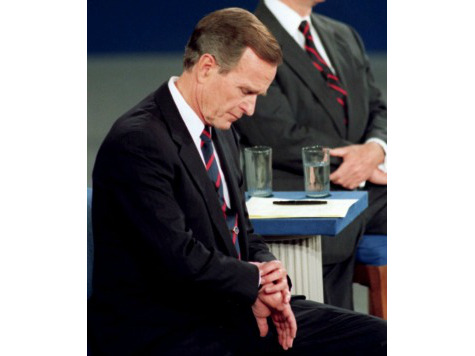
If President Barack Obama is hoping to dominate Mitt Romney in Tuesday night’s town hall debate, he needs to rethink his strategy. And if Romney believes he can seal the election with another lopsided performance, he’s also probably wrong.
The reason for both is simple: almost all the damage in town hall-style presidential debates is self-inflicted. The only way to win is to allow your opponent to make mistakes.
That’s not to say the candidates won’t have an opportunity to reinforce their strengths. Bill Clinton’s victory over George H.W. Bush in their town hall debate in 1992 was so emphatic precisely because he connected so well with the people in the room. But it was Bush’s aloof demeanor and his infamous watch-checking gesture that cost him most. Likewise with Al Gore’s silly walk towards George W. Bush in 2000, and John McCain’s bizarre “that one” reference to Obama during the town hall debate in 2008.
If Obama is listening to the advice of countless media pundits that suggest he ought to come out more aggressively–and all signs are that he will try to do just that–then he is heading for trouble. Not only is Romney at his best when being attacked, but attacking Romney in front of a group of real-life voters will seem petty and will likely reinforce perceptions of Obama as running a negative campaign without new ideas or proposals.
Similarly, if Romney listens to his innumerable critics who describe him as out of touch with ordinary people (based on very little evidence), and tries too hard to “empathize” with the people in the room, he may end up looking foolish. Yet he cannot be passive, either, and rest on his laurels, because that will lend credence to the media’s narrative.
There really is only one strategy that works in town hall debates: respect the people in the room, no matter how odd or awkward their questions may be. They are proxies for the American people as a whole.
Time spent attacking one’s opponent is worse than wasted: it damages the attacker. If an opponent says something that must be corrected, best to do it as quickly as possible, with a general rebuff rather than specific rebuttals.
The only person in the room who is fair game is the moderator–who, as always, is the filter between the candidates and the public, and therefore disliked by everybody.
Yet attacking the moderator has to be done more carefully in a town hall, and especially–it must be said–when the moderator is female. Correcting her is okay; complaining to her or criticizing her directly will not work, either in the room or among viewers at home.
NBC’s Chuck Todd, perhaps trying to lower expectations for Obama’s performance, speculated today that Romney could land a knockout blow. It is unlikely that will happen. The only way it might is if Obama makes a major blunder, which will probably only happen if he is too aggressive. He is out of practice in the town hall format, but he knows his talking points. If he is assertive, but not Joe Biden-style abusive, he will do well enough.
As for Romney, he has to think about the aftermath of the debate as well as the debate itself. The media will, undoubtedly, report that Obama improved from the first debate (in fairness, he could hardly have been worse).
What Romney wants voters to remember about the debate the next day is not whether he scored more points but how he played the game. And if he is forceful yet friendly, he will have played it right. With luck, Obama will play it wrong.

COMMENTS
Please let us know if you're having issues with commenting.